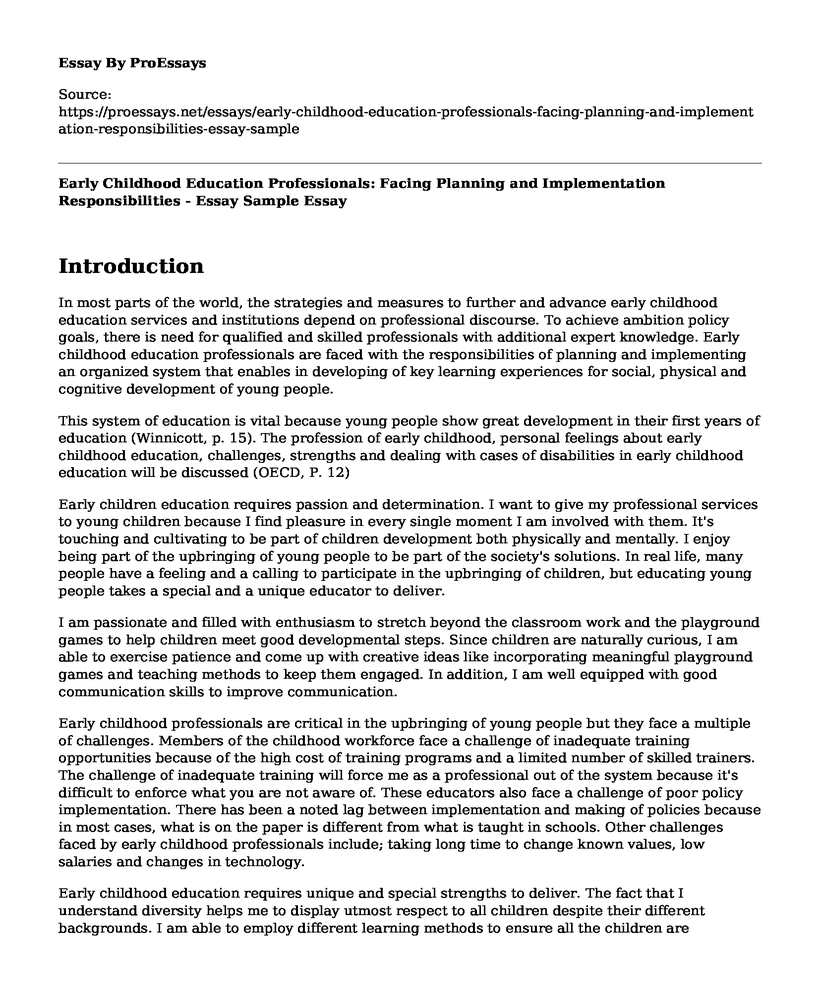Introduction
In most parts of the world, the strategies and measures to further and advance early childhood education services and institutions depend on professional discourse. To achieve ambition policy goals, there is need for qualified and skilled professionals with additional expert knowledge. Early childhood education professionals are faced with the responsibilities of planning and implementing an organized system that enables in developing of key learning experiences for social, physical and cognitive development of young people.
This system of education is vital because young people show great development in their first years of education (Winnicott, p. 15). The profession of early childhood, personal feelings about early childhood education, challenges, strengths and dealing with cases of disabilities in early childhood education will be discussed (OECD, P. 12)
Early children education requires passion and determination. I want to give my professional services to young children because I find pleasure in every single moment I am involved with them. It's touching and cultivating to be part of children development both physically and mentally. I enjoy being part of the upbringing of young people to be part of the society's solutions. In real life, many people have a feeling and a calling to participate in the upbringing of children, but educating young people takes a special and a unique educator to deliver.
I am passionate and filled with enthusiasm to stretch beyond the classroom work and the playground games to help children meet good developmental steps. Since children are naturally curious, I am able to exercise patience and come up with creative ideas like incorporating meaningful playground games and teaching methods to keep them engaged. In addition, I am well equipped with good communication skills to improve communication.
Early childhood professionals are critical in the upbringing of young people but they face a multiple of challenges. Members of the childhood workforce face a challenge of inadequate training opportunities because of the high cost of training programs and a limited number of skilled trainers. The challenge of inadequate training will force me as a professional out of the system because it's difficult to enforce what you are not aware of. These educators also face a challenge of poor policy implementation. There has been a noted lag between implementation and making of policies because in most cases, what is on the paper is different from what is taught in schools. Other challenges faced by early childhood professionals include; taking long time to change known values, low salaries and changes in technology.
Early childhood education requires unique and special strengths to deliver. The fact that I understand diversity helps me to display utmost respect to all children despite their different backgrounds. I am able to employ different learning methods to ensure all the children are motivated and satisfied. In addition, I would like to improve my flexibility skill to get off the course while coming up with a good lesson plan. This will help in relieving stress levels. Needy and disabled children should be provided with oral instructors especially for children with reading problems. Time to time progress checks and concise tasks will help disabled children.
Work Cited
Garrison, J. (1996). A Deweyean theory of democratic listening. Educational Theory, 46(4), 429-451. doi: 10.1111/j.1741-5446.1996. 00429.x
Larson, M. S. (1977). The rise of professionalism: a sociological analysis. Berkeley: University of California Press. doi: 10.1002/9781119395485.ch20
Mac Naughton, G. (2003). Shaping Early Childhood. Learners, Curriculum and Contexts. Berkshire: Open University Press. Retrieved from https://epdf.pub/shaping-early-childhood.html
Mac Naughton, G. (2005). Doing Foucault in early childhood studies: applying poststructural ideas. London: Routledge. doi: 10.4324/9780203465332
Murray, C. (2006). The Conceptualisation of Diversity and Equality in Early Childhood Care and Education. Unpublished MSc thesis, University College Dublin, Dublin. Retrieved from https://arrow.tudublin.ie/cgi/viewcontent.cgi?article=1026&context=csercon
Oberhuemer, P. (2005). Conceptualising the Early Childhood Pedagogue: Policy Approaches and Issues of Professionalism. European Early Childhood Education Research Journal, 13(1), 5-1. doi: 10.11648/j.ijeedu.20190801.11
Mead, M. (1978). Culture and Commitment. The New relationships between the Generations in the 1970s. New York: Columbia University Press.
Cite this page
Early Childhood Education Professionals: Facing Planning and Implementation Responsibilities - Essay Sample. (2023, May 14). Retrieved from https://proessays.net/essays/early-childhood-education-professionals-facing-planning-and-implementation-responsibilities-essay-sample
If you are the original author of this essay and no longer wish to have it published on the ProEssays website, please click below to request its removal:
- Clarion School for Boys Case Study
- Terminology of Case: Linguistic Article Review
- Essay Example on Giftedness: Definitions & Perspectives According to Joseph S. Renzulli
- Deciding a University: High School Students' Hardest Decision - Essay Sample
- Essay Example on Nursing Student's First Hospital Clinical: Expectations, Confidence, and Vital Signs
- Essay on Equipping College Students with Sexual Health Knowledge: Providing Condoms in Schools
- Changing the School Climate - Essay Sample







